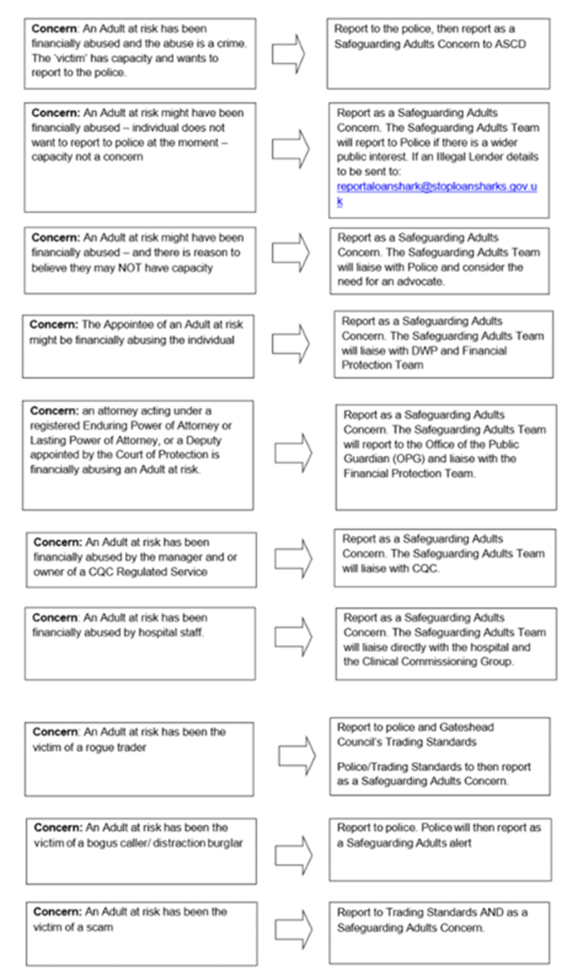Financial Abuse
Financial Abuse includes:
- Having money or other property stolen;
- Being defrauded;
- Being put under pressure in relation to money or other property;
- Having money or other property misused.
Financial abuse can occur in isolation, but as research has shown, where there are other forms of abuse, there is likely to be financial abuse occurring. Although this is not always the case, everyone should also be aware of this possibility.
There are certain characteristics that might mean that a person is more likely to be a victim of financial abuse. The following are general indictors that, if present, may increase the risk of financial abuse occurring:
- The adult has communication difficulties;
- The adult is socially isolated i.e. do not have friends or visitors;
- The adult is dependent on a carer or family member for financial purposes;
- The adult has substance misuse problems.
Potential indicators include:
- A change in living conditions;
- A lack of heating, clothing or food;
- An inability to pay bills/unexplained shortage of money;
- Unexplained withdrawals from an account;
- Unexplained loss/misplacement of financial documents;
- The recent addition of authorised signers on a client or donor's signature card;
- Sudden or unexpected changes in a will or other financial documents.
This is not an exhaustive list, nor do these examples prove that there is actual abuse occurring. However, they do indicate that a closer look and enquiries may be needed.
Consider financial and material abuse when an adult:
- Does not have their money or possessions appropriately recorded by a care provider;
- Loses money or possessions;
- Does not have access to their money, or to possessions that they want or need;
- Is not routinely involved in decisions about how their money is spent (for example if they do not get a personal allowance), or how their possessions are used;
- Appears to have bought things they do not need or invested money in things where they may lack capacity to make informed decisions;
- Finds the person managing their financial affairs to be evasive or uncooperative;
- Has family or others that show an unusual interest in their assets;
- Has unusual difficulty with their finances;
- Is uncharacteristically protective of money and things they own.
Suspect financial and material abuse when an adult:
- Has their money spent or their possessions or property used by other people, in a way that does not appear to benefit the resident (for example, their personal allowance being used to fund staff gifts, or misuse of loyalty card points);
- Has treasured personal items constantly go missing;
- Gets married or enters a civil partnership, if they are likely to lack capacity to consent to this;
- Changes a will under duress or coercion;
- Signs a lasting power of attorney when they do not have the mental capacity to make this decision;
- Does not keep personal financial information confidential.
Anyone can be a perpetrator of financial abuse.
Common perpetrators are:
- Family members, including sons, daughters, grandchildren, or spouses who may:
- Have substance abuse, gambling, or financial problems;
- Stand to inherit and feel justified in taking what they believe is "almost" or "rightfully" theirs;
- Fear that their family member will get sick and use up their savings, depriving the abuser of an inheritance;
- Have had a negative relationship with the person and feel a sense of "entitlement";
- Have negative feelings toward siblings or other family members whom they want to prevent from acquiring or inheriting the older person's assets.
- Predatory individuals who seek out vulnerable people with the intent of exploiting them. They may:
- Profess to love the person ("sweetheart scams") or befriend them;
- Seek employment as personal care assistants, counsellors, etc. to gain access;
- Identify vulnerable persons by driving through neighbourhoods (to find persons who are alone and isolated) or contact recently widowed persons they find through newspaper death announcements;
- Move from community to community to avoid being apprehended (transient criminals).
- Unscrupulous professionals or businesspersons, or persons posing as such. They may:
- Overcharge for services or products;
- Use deceptive or unfair business practices;
- Use their positions of trust or respect to gain compliance.
Beware of:
- The abuser making excuses for their behaviours such as "I need this money more than they do" or "I'll inherit this money anyway";
- The victim may be defensive and insist they do not want to complain or "it was their choice to give the person the money / property" however often they are a victim of 'grooming'.
Where financial abuse has occurred or there are ongoing concerns about financial management the following may need to be included in a safeguarding plan
- Change in Appointeeship;
- Criminal prosecution;
- Application to the Court of Protection to change a Lasting Power of Attorney or Deputyship;
- Bank account suspended/changed;
- Set up or cancel direct debits or standing orders;
- Action required in relation to the perpetrator;
- Provide new or increased support services;
- Complete Financial Profile and Financial Care and Support Plan;
- Other support to empower the adult to take control of the situation.
Last Updated: October 14, 2025
v26
